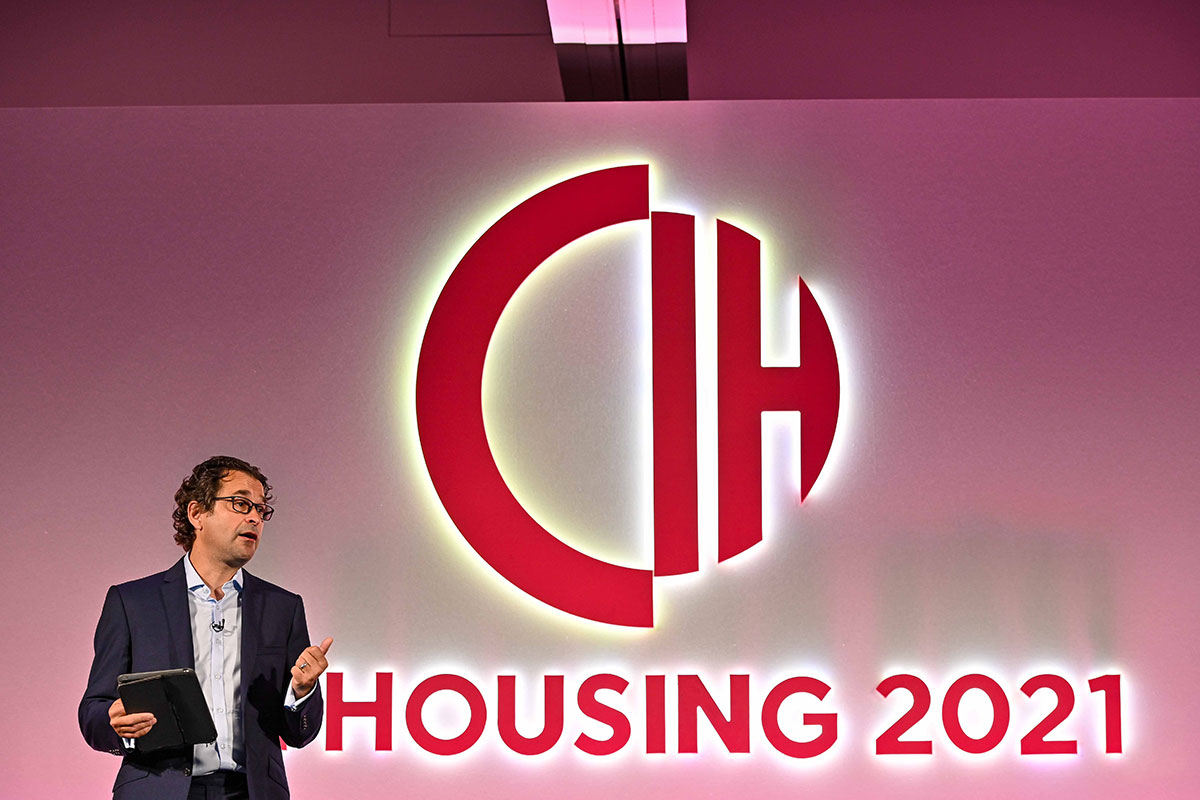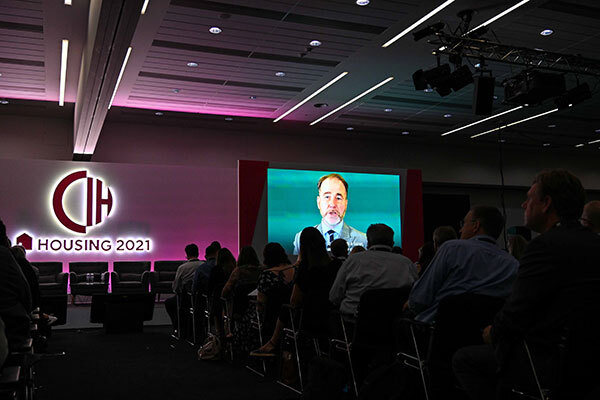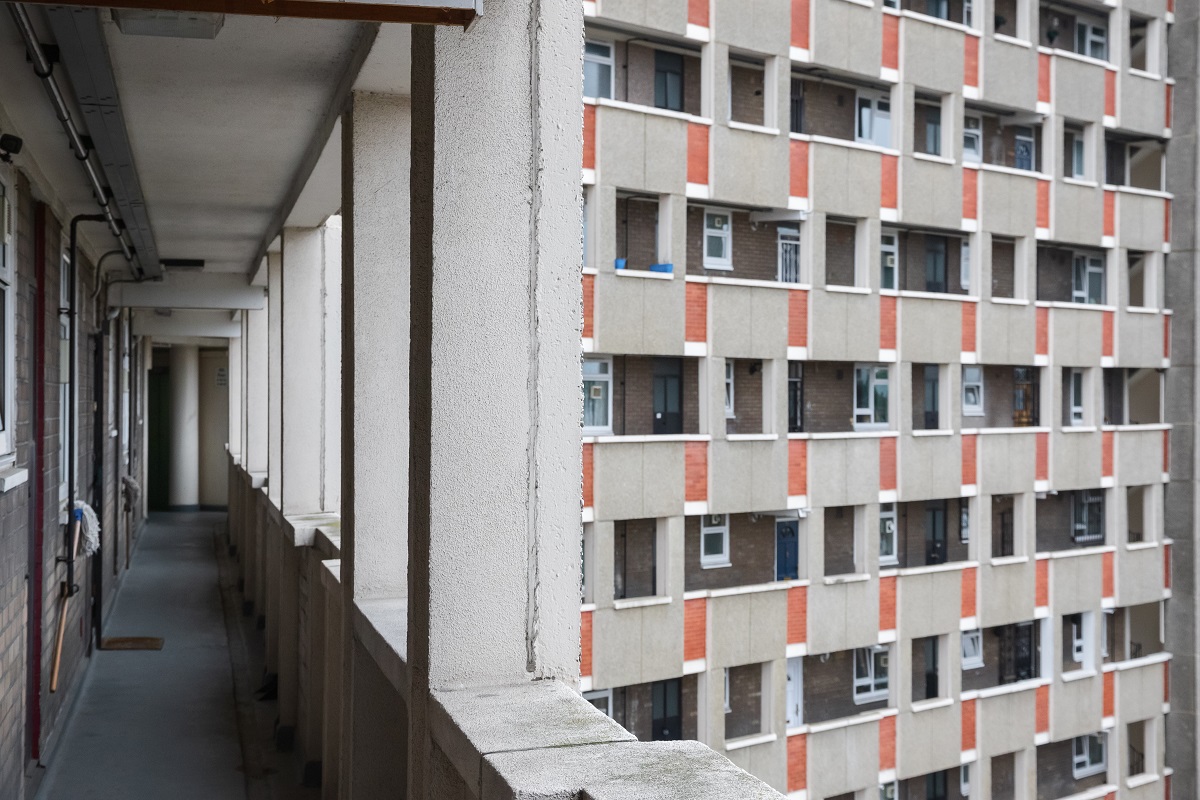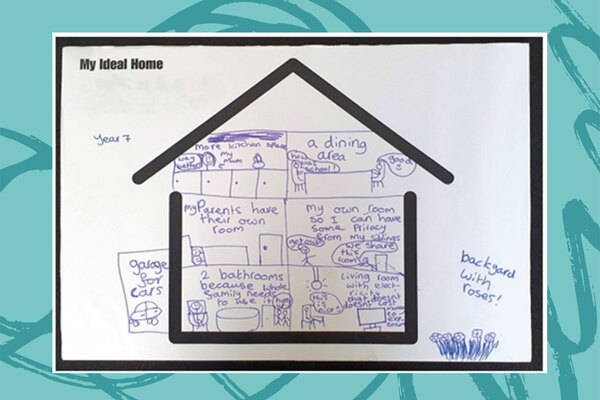In full: Gavin Smart’s opening address to Housing 2021
The full text of the speech given by Gavin Smart, chief executive of the Chartered Institute of Housing, to open Housing 2021
“Good morning, everybody. Good morning. Welcome to Housing 2021 in Manchester. It’s great to be here at last isn’t it. After a long time, you’re very, very, very welcome. It’s great to see you all. I hope you enjoy the whole of the event. It feels this year, kind of, I guess, more than any other, really exciting to be here, to be able to reconnect individually, to see each of you face to face and to leave behind a couple of days, at least the kind of tyranny of Zoom and Teams calls that I think I’ve been subjected to.
I don’t know that all of you will have been for the last 18 months as well. And it, and it feels very familiar, but also very new actually to be alongside so many people in what is my, and I guess yours and CIH’s first physical events since the Scottish housing festival in February of 2020 and how the world has changed since then.
And looking back now, I guess how little we knew about what was to come, it’s been quite a time, hasn’t it, but because it’s been such a long time since we were together, it feels right to reflect on what has been a pretty tumultuous last 20 months. And it seems to me that the pandemic has changed the way that we think about home, hasn’t it. I think it’s changed it fundamentally.
The value that we place upon a safe, secure, affordable home, I think has never been greater – homes became even more central to our lives. They served as offices, classrooms, gyms, places of worship. And in many ways, I think the story of the unequal impact of the pandemic is the story of long-standing dimensions of inequality in our country and in our housing system. And it’s demonstrated more starkly than ever before the importance of creating a functioning housing market that works for all of us.
And that goal will remain a foundation on which much of the work of CIH is based. And that’s also why at CIH, we aren’t going back to the old ways of doing business. Just like you, we are adapting what we do. We’re changing our services and our offer to ensure that you have the professional body that you deserve.
And it’s why we’ve adopted a new model of exclusive events, which are free for our members, delivering ever greater benefits to you from your CIH membership, we’ve invested in a brand new mentoring platform, connecting you to an incredible network of housing professionals across the country, just so important, for skills development and career progression.
And it’s why later this month, we’re going to launch an interactive tool to support our new professional standards so that everybody in this room and across the sector and the wider housing profession has access to the skills, the values, the behaviours that you need to excel at the work that you do.
And it’s important because the work that you do is so important. At our very best, the impact that we have on people’s lives, on communities is transformational. And it’s right that we should invest in that and look to develop ourselves to be as good as we can be.
Now, I want to talk a little bit more about the standards in a moment, but before that, I want to acknowledge that we don’t operate in a vacuum. The work that we do all day every day is heavily informed by the policies and the priorities of governments across the UK.
Now in England, I think we know the challenges that we face about the pace of progress, about the speed at which legislation comes forward. We know that we need to build around about 340,000 new homes a year of which 90,000 homes need to be new social rented homes, just to keep pace with demand, to help house the 1.1 million people currently on local authority waiting lists. We urgently need to provide safe, secure accommodation to house those 200,000 people who class as part of core homelessness in England.
And perhaps the greatest challenge is to make sure these homes are fit for our zero-carbon future. A future that could cost the social housing sector as much as £2.4bn every year. And whilst we all have a responsibility to do all we can to meet these myriad challenges, head-on, we must also have a willing and committed partner in government. Now that’s a partner that we must feel that we can collaborate with, but also a partner we feel that we can challenge when they fall short of the decisive action that we think is needed.
And there are a number of areas where I think the government needs to take a different approach and we’re calling for a number of things. So it seems to me that we need government to do more on the intensives and the support for the social housing sector to green its homes.
We need to see the details confirmed with the £3.8bn Social Housing Decarbonisation Fund. And in the private sector, we need a replacement programme for the Green Homes grant scheme.
So we need a realistic and ambitious pathway for all new homes to be zero carbon. And we need critical decisions to be made on the future of heating systems and decarbonisation of our energy grid. We need the mobilisation of supply chain and reskilling of our workforce.
And these are huge issues which can’t wait. In the same way, I think we need to see further government support for building new homes at social rent. Now the recent £8.6bn funding commitment shows a welcome commitment on behalf of government to providing affordable housing. But half of that programme is allocated to homeownership products and it will deliver only 29,000 new social rented homes across its lifetime. It’s far fewer than what we need and we will need to do more.
I think we also need government to reconsider its proposed abolition of Section 106, given the critical role that it plays in the delivery of affordable housing supply. And in the same way, I think government needs to pause for thought in terms of the proposed extension to permitted development rights. Too many of the homes delivered via that mechanism are of poor quality and poor design. And in short, they are not the homes that we should be building for our future. We have to build for quality and sustainability as well as for numbers.
Moving to welfare, the £20 Universal Credit uplift needs to be retained. And in the same way, we need to make sure that the Local Housing Allowance remains pegged to the 30th percentile. Now, ideally, both of those things will happen alongside a wider stream of work to consider how we can better co-ordinate welfare and housing policies. Too often they still pull in different directions.
And there is more work I think for government to do, to create a fully funded Building Safety Fund to support remediation works for existing buildings that are within scope to ensure that they are compliant ahead of the new regulatory regime.
Now these costs that landlords and property owners face are driven by a systemic failure in our previous system of regulation of buildings. And it seems to me the costs should not fall on building owners who acted in good faith. And in particular, it seems unfair to me that leaseholders should be expected to pick up the costs of regulatory failure.
Now, the government has an opportunity to send a clear message on their commitment to working with us on all of these priorities and to overcome these challenges, because we believe that the long-awaited Spending Review is likely to happen this autumn. To be frank, it must – too much time has already been lost. And we look forward to working with the government as they debate the Spending Review and its outcomes.
But whilst we’re asking all this of government, we must also ask of ourselves. We must ask whether the relationship that social landlords have with the people who live in the homes that they own and manage is the one that they would want it to be. Now, often it is, but sometimes it is not. The Social Housing White Paper, and the proposed changes to the regulatory framework, set out a vision for the way in which this relationship should be recast and rebalanced.
And the regulator’s proposed tenant satisfaction measures, which we are helping to shape, are one way of assessing that relationship. And they send a clear, clear signal about the importance of focusing on the experience of the people who live in the homes that we own and manage, the people that we work for.
In the same way, the government’s review of professionalism and qualifications provides a real opportunity to look to drive forward the agenda of professionalising the housing sector.
Unsurprisingly, you will know that’s a subject very close to my heart and to the heart of all my colleagues at CIH. But in the same way, it’s right that we do not wait for all of these processes to conclude before we decide on the kind of relationship we should have with the people that we work with and we work for.
We need to, and I know many of you already are, get on now with what we already know to be right. We don’t need to wait for all of these processes to complete. And across the UK, CIH is working hard to make a strong case for the kind of structural changes that we need to see to see improvement in our housing system. So alongside our work in England, we are active in every nation of the UK.
In Scotland, we are sharing a government working group looking to improve the outcomes of victims of domestic abuse living in the private rented sector. And we are working with local authorities to drive changes needed to improve rapid rehousing transition plans, which are a critical step in the work to end homelessness in Scotland.
In Wales, we’re calling on the government to work with us to create a workforce strategy, to ensure that we have the right level of skills to meet the challenge of the climate emergency. And we’re making the case to government for guaranteed long-term funding for the social housing sector to deliver the new low-carbon homes that we need for the future.
And in Northern Ireland, critically important work and exciting work is beginning now on revitalising the Northern Ireland Housing Executive.
There are important questions to be answered about the financial and governance arrangements for the future of a revitalised housing executive. And I’m delighted that CIH is playing its part in those discussions.
So you see there is one CIH working for the benefit of you and members of the wider sector and in the public interest across the whole of the UK. Recently the social housing sector, the quality of the homes we manage and the way we treat the tenants and residents that we work with and for has been a subject of some high-profile attention. I think we all understand that it’s virtually impossible to get everything right all of the time, but that is what we must strive to do, and equally importantly when we do not, we must put things right as quickly and fully as we can. To acknowledge our failings, to apologise, to put things right, to learn and to improve is part of what it means to be a professional.
We must also be proud, though, of the great work that we do and celebrate all that is good and great about the housing profession and the difference that you make every day to people’s lives. To steal words from our previous president, Jim Strang: “The work you do is transformational. Every day housing professionals have the ability to change people’s lives for the better, in a way that many other professions would give their eye-teeth for.”
We should not lose sight of that. In order to build this culture, to drive change, we must truly engage with and listen to tenants, residents and customers, the people and communities we exist to serve, we work for, and we work with. And at CIH, we are here to help you with that and to support you in that work.
So with that in mind, I want to talk a little bit more about the professional standards, and I’m genuinely excited to be leading an organisation that is providing you with the tools that can help you and help your organisations to drive the change required to meet head-on the challenges outlined in the Social Housing White Paper.
Already landlords are using our professional standards, embedding them at the heart of their work, in their approach to recruitment, to training, to development, to procurement and of course, in the homes and the services they deliver to the people and communities that they work with.
Individual members are using them to assess where they are on their career journey, to identify where the gaps are in their knowledge and behaviours to try to become the best housing professional that they can be – something I think that we would all aspire to. And if you’re not using them, then we’d love to talk to about professional standards, because they speak to the very heart of what it means to be a housing professional.
As I’ve said, our work is different. It is unique. It directly impacts on people’s experience of home. I can’t imagine anything more fundamental than that. As Aileen Evans, another one of my previous presidents says: “Home is where we start from.”
Your work impacts on people’s homes. There is nothing more important.
Alongside this, it is particularly important to me that in our work at CIH, we work hard to become a more diverse organisation in our governance, in our membership, as an employer, in what we train and what we teach in the platforms and the events we create and promote. We are working very hard on all of that, I promise you, and we’ve made some good progress, but we have further to go. And I also want to publicly recognise that we’ve got a sector leadership role and that’s a role, make no mistake, that we want and are willing to play.
History teaches us that seismic events always act as catalysts for change. And without doubt, the pandemic has been a seismic event. The biggest peacetime challenge that our country has faced, and the globe has faced since the Second World War.
And as we start to move towards wherever our new normal begins to look like, we do have an opportunity to place housing at the centre of the UK’s recovery from the COVID pandemic. So I want to ask for your help. If you are a member, help us shape that role. Come with us on that journey. If you’re not a member, why not? But come with us on that journey – together, we can create a profession and a housing sector that we know that we can be served by a professional body that you deserve so that together we can create a future in which everybody has a safe, secure, decent and affordable place to call home.
So I encourage you all now to take advantage of the fantastic opportunity we’ve got across the next two or three days to learn new things, which you can take back to your work, to build new relationships, to have conversations, conversations with people you won’t have seen for nearly two years. I know I can’t wait for that experience. Great things happen when housing professionals get together and I’ve missed the opportunity to talk to all of you. So I hope that what I’m saying to you now is the start of a conversation – a conversation, if you like, that has been paused for the best part of two years, we can begin again to talk to each other, to learn together, to develop together.
And the next three days provides us with that opportunity. And at that point, thank you very much for listening. I wish you very well. I hope you enjoy the conference. Enjoy the next three days. Thank you very much.”
Gavin Smart, chief executive of the Chartered Institute of Housing, speaking on the first day of Housing 2021, 7 September 2021
Housing 2021 runs from Tuesday 7 September to Thursday 9 September. For more information about the conference, click here.
Sign up for our daily newsletter
Already have an account? Click here to manage your newsletters













